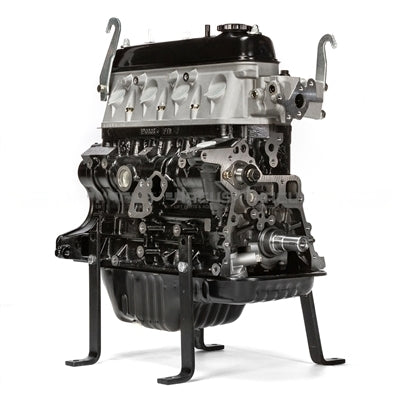The Ultimate Guide to the Engine: Trick Insights for every single Car Lover
Recognizing the engine is basic for any automobile lover, as it offers as the heart of the vehicle and determines its performance. The complexities of engine characteristics and the latest developments in innovation present questions that merit additional expedition.
Composition of an Engine
Comprehending the composition of an engine is vital for any kind of auto fanatic aiming to dive much deeper into automobile mechanics. An internal burning engine largely is composed of a number of essential components that work in unison to transform gas into mechanical energy.
At the heart of this system exists the cyndrical tube block, which houses the cylinders where combustion occurs. Piston activity within these cyndrical tubes is assisted in by the crankshaft, which translates straight movement into rotational power. Furthermore, the camshaft plays an important role in regulating the opening and closing of the engine's shutoffs, guaranteeing appropriate air-fuel mixture consumption and exhaust gas expulsion.
Other important parts consist of the fuel system, which provides the engine with the required gas, and the ignition system, responsible for starting combustion - 4y engine. The air conditioning and lubrication systems are also essential, preserving optimal operating temperature levels and decreasing rubbing, respectively
Engine Kinds and Configurations
A varied variety of engine types and configurations exists, each offering special advantages and negative aspects tailored to various driving needs and preferences. One of the most common engine kinds include inline, V, flat, and rotating configurations.
Inline engines, featuring cyndrical tubes organized in a solitary line, are known for their simplicity and performance. They are usually located in compact automobiles, offering a balance of power and economic situation. V engines, characterized by their two financial institutions of cylinders organized in a V form, provide higher efficiency and smoother procedure, making them preferred in sports and high-end autos.
Flat engines, or boxer engines, have actually flat opposed cyndrical tubes, which add to a lower center of gravity, boosting lorry stability. These are typically seen in brand names like Subaru and Porsche.
Rotating engines, although much less usual, make use of an unique style with a triangular rotor and deal high power-to-weight ratios. They succeed in portable and light-weight applications, mostly seen in Mazda vehicles.
Each engine type serves particular efficiency features, weight circulations, and gas efficiencies, making sure that auto fanatics can pick the right engine configuration to match their driving style and vehicle requirements.

Just How Engines Function
Engines, despite their type or setup, operate on fundamental concepts that control their efficiency and effectiveness. At their core, engines convert fuel right into power with a series of controlled surges or compressions. This procedure commonly entails 4 main strokes: intake, compression, power, and exhaust.
During the intake stroke, the engine attracts in a mix of air and gas. In the power stroke, a spark stirs up the compressed blend (in gasoline engines) or the mix ignites spontaneously (in diesel engines), resulting in a quick expansion of gases that presses the piston down.
The efficiency of an engine is affected by different variables, including the style of the burning chamber, the sort of gas read here made use that site of, and the precision of the engine's elements. Recognizing these fundamental principles is crucial for cars and truck enthusiasts who seek to value the detailed mechanics behind their lorries, as well as for those aiming to boost efficiency through adjustments and adjusting.
Technologies in Engine Technology
In recent years, improvements in engine modern technology have actually considerably transformed the vehicle landscape, boosting both efficiency and environmental sustainability. Among one of the most remarkable innovations is the growth of turbocharging and supercharging, which allows smaller engines to produce greater power results without sacrificing fuel effectiveness. This has caused a surge in the appeal of scaled down engines, giving suppliers with the capacity to fulfill rigorous exhausts laws while keeping efficiency requirements.
Furthermore, hybrid and electric powertrains are improving the engine standard. Crossbreed systems integrate interior combustion engines with electrical motors, maximizing gas usage and decreasing discharges. Fully electric vehicles (EVs) remove the burning engine entirely, depending on advanced battery technology to supply immediate torque and excellent acceleration.
Additionally, the integration of artificial knowledge and artificial intelligence in engine management systems enables real-time optimization of efficiency parameters, boosting effectiveness and responsiveness. Advancements such as variable valve timing and straight gas injection better get more fine-tune combustion procedures, making best use of power result while reducing waste.
As the automotive sector continues to advance, these technologies in engine technology will play an important function in shaping the future of movement, focusing on both performance and sustainability.
Upkeep Tips for Fanatics
Keeping an engine is as essential as the technologies that improve its efficiency. Regular upkeep not only extends the life of your engine yet likewise makes certain optimum performance. Beginning with routine oil modifications, adhering to the producer's referrals for oil type and modification periods. Tidy oil lubricates engine elements properly, stopping damage.
Replace and check air filters regularly to make sure appropriate air flow, which is vital for burning performance. A clogged up air filter can bring about lowered efficiency and raised gas intake. Keep an eye on the coolant degrees to avoid getting too hot, and change coolant according to the solution routine. 4y engine.

Verdict
In conclusion, a detailed understanding of engine anatomy, kinds, and mechanics is important for automobile lovers. Normal upkeep practices, consisting of oil adjustments and air filter checks, are vital for guaranteeing optimal engine performance and durability.

Engines, regardless of their type or configuration, operate on basic concepts that govern their performance and efficiency. In the power stroke, a stimulate ignites the pressed mixture (in gasoline engines) or the mix fires up automatically (in diesel engines), resulting in a quick growth of gases that pushes the piston down.In recent years, innovations in engine technology have actually dramatically transformed the automobile landscape, boosting both efficiency and ecological sustainability.